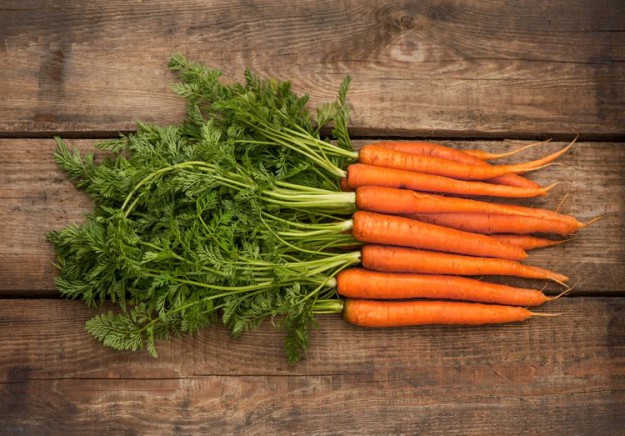Carrots: Your ticket to a healthy tan
mis à jour le 14 July 2015 à 18:30Rich in beta-carotene and a powerful antioxidant, carrots can also help us achieve that dreamy tanned complexion.
Carrots are in the same botanical family (Apiaceae) as celery or parsley, making it a very old acquaintance in the human diet; we've been consuming it for five thousand years and counting. Yet, it wasn't until the late 19th century that the orange vegetable became popular. Though the best ones are cultivated in Spring, carrots are always found on the grocery store shelves so you can enjoy their health benefits all year round.
Serving carrots
It's worth highlighting that carrots gave their name to a very beneficial pigment called beta-carotene, which are precursors of vitamin A (our body converts into vitamin after digestion). It's excellent for eyesight, skin complexion, and it prevents cardiovascular disease and certain types of cancers. Since it is soluble in fat, it's best to combine carrots with a little bit of fat in your meal — think oil, almonds, cheese. Carrots, when prepared mashed or sliced, eases its uptake by the body. These beta-caroten are concentrated near the skin so instead of peeling your carrots, brush them. Choose ones that are really bright in colour, guaranteeing their antioxidant potential.
Moreover, carrots contain a moderate amount of Vitamin C, which isn't very resistant when cooked. To preserve it, it's better to chew your carrots raw or, better, chop them up for easy digestion. If you're serving two, mix 1/2 grated raw beetroot with 2 medium carrots, and season it with lemon juice (to prevent darkening), oil (olive, sesame or rapeseed) and 1 tsp. of caraway coffee seeds. Juicing carrots facilitates the assimilation of ß-carotene but don't exceed 5 servings per week to avoid turning orange.
Easy on the digestive system
Carrots contain both soluble (pectin) and insoluble (cellulose) fibres, so they are valuable for the intestinal system. Raw carrots facilitate the passage of food and cooked ones ease the process. Despite its sweet taste, it is low in calories (approx. 36 cal per 100 g).
The best companions
Carrots go well with carminative seeds like caraway, coriander, cumin, but also with exotic ones like nutmeg and cardamom. They also blend well with ginger, galangal and turmeric, which are all anti-inflammatory.
Martine Azoulai




